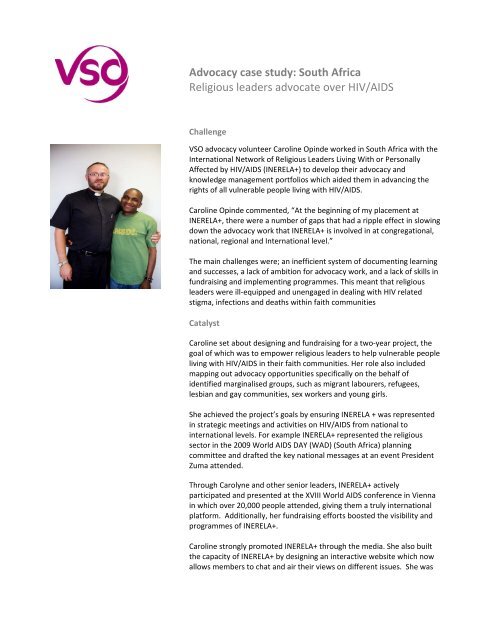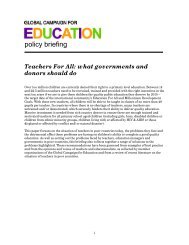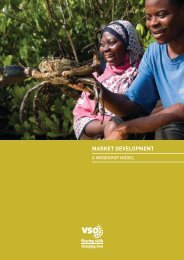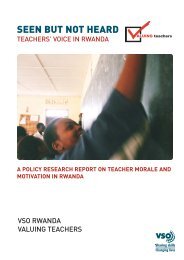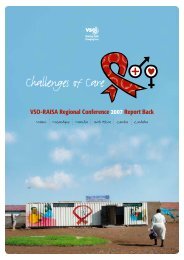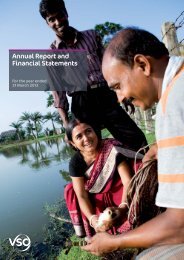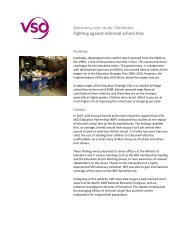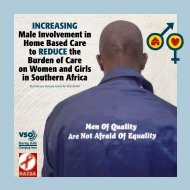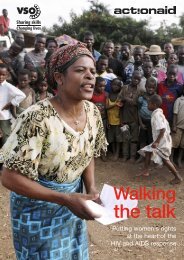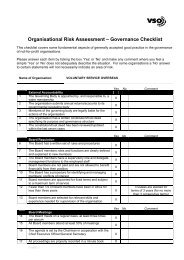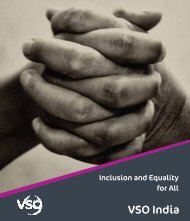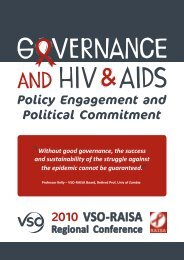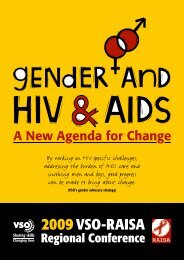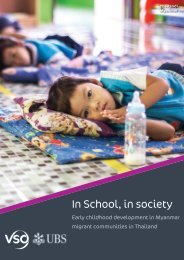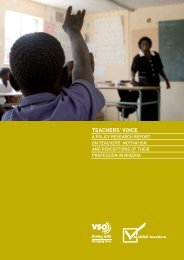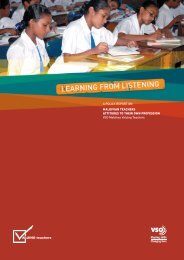Religious leaders advocate over HIV/AIDS, South Africa - VSO
Religious leaders advocate over HIV/AIDS, South Africa - VSO
Religious leaders advocate over HIV/AIDS, South Africa - VSO
You also want an ePaper? Increase the reach of your titles
YUMPU automatically turns print PDFs into web optimized ePapers that Google loves.
Advocacy case study: <strong>South</strong> <strong>Africa</strong><br />
<strong>Religious</strong> <strong>leaders</strong> <strong>advocate</strong> <strong>over</strong> <strong>HIV</strong>/<strong>AIDS</strong><br />
Challenge<br />
<strong>VSO</strong> advocacy volunteer Caroline Opinde worked in <strong>South</strong> <strong>Africa</strong> with the<br />
International Network of <strong>Religious</strong> Leaders Living With or Personally<br />
Affected by <strong>HIV</strong>/<strong>AIDS</strong> (INERELA+) to develop their advocacy and<br />
knowledge management portfolios which aided them in advancing the<br />
rights of all vulnerable people living with <strong>HIV</strong>/<strong>AIDS</strong>.<br />
Caroline Opinde commented, “At the beginning of my placement at<br />
INERELA+, there were a number of gaps that had a ripple effect in slowing<br />
down the advocacy work that INERELA+ is involved in at congregational,<br />
national, regional and International level.”<br />
The main challenges were; an inefficient system of documenting learning<br />
and successes, a lack of ambition for advocacy work, and a lack of skills in<br />
fundraising and implementing programmes. This meant that religious<br />
<strong>leaders</strong> were ill‐equipped and unengaged in dealing with <strong>HIV</strong> related<br />
stigma, infections and deaths within faith communities<br />
Catalyst<br />
Caroline set about designing and fundraising for a two‐year project, the<br />
goal of which was to empower religious <strong>leaders</strong> to help vulnerable people<br />
living with <strong>HIV</strong>/<strong>AIDS</strong> in their faith communities. Her role also included<br />
mapping out advocacy opportunities specifically on the behalf of<br />
identified marginalised groups, such as migrant labourers, refugees,<br />
lesbian and gay communities, sex workers and young girls.<br />
She achieved the project’s goals by ensuring INERELA + was represented<br />
in strategic meetings and activities on <strong>HIV</strong>/<strong>AIDS</strong> from national to<br />
international levels. For example INERELA+ represented the religious<br />
sector in the 2009 World <strong>AIDS</strong> DAY (WAD) (<strong>South</strong> <strong>Africa</strong>) planning<br />
committee and drafted the key national messages at an event President<br />
Zuma attended.<br />
Through Carolyne and other senior <strong>leaders</strong>, INERELA+ actively<br />
participated and presented at the XVIII World <strong>AIDS</strong> conference in Vienna<br />
in which <strong>over</strong> 20,000 people attended, giving them a truly international<br />
platform. Additionally, her fundraising efforts boosted the visibility and<br />
programmes of INERELA+.<br />
Caroline strongly promoted INERELA+ through the media. She also built<br />
the capacity of INERELA+ by designing an interactive website which now<br />
allows members to chat and air their views on different issues. She was
also instrumental in publishing a quarterly newsletter Positive Faith in<br />
Action distributed to national offices, 18 in <strong>Africa</strong> and 16 other<br />
international faith based organisations, including World Vision, Cordaid<br />
and Cafod. The newsletter produced articles and stories written by faith<br />
based <strong>leaders</strong>, who called on their followers to change their attitude<br />
towards stigmatising people living with <strong>HIV</strong>/<strong>AIDS</strong>.<br />
Results<br />
As a result of Caroline’s work, religious <strong>leaders</strong> now talk more freely and<br />
confidently (including to their congregations) on <strong>HIV</strong>/<strong>AIDS</strong> thus reducing<br />
the stigma associated with it significantly. To some extent, marginalised<br />
groups are now being included in <strong>HIV</strong>/<strong>AIDS</strong> programming.<br />
Importantly, the voice of religious <strong>leaders</strong> can now be heard in strategic<br />
discussions at all levels. The 18 national offices in <strong>Africa</strong> which receive the<br />
INERELA+ newsletter also are capitalising on the respect that they receive<br />
as religious <strong>leaders</strong> to shape and influence policy at national level. Thus it<br />
can be said that INERELA+ as a whole are influencing policy at an<br />
international level.<br />
In reflection, by placing volunteers in strategic places, <strong>VSO</strong> is able to build<br />
the capacity of organisations that have an international reach and thus<br />
influence international policy.


